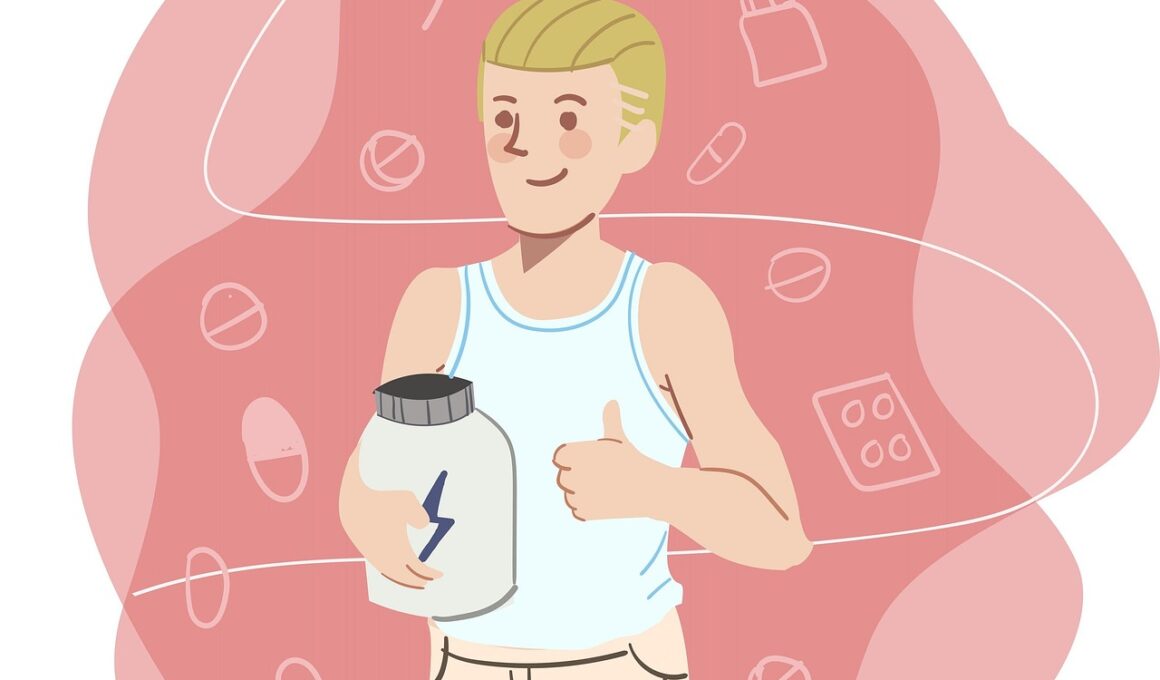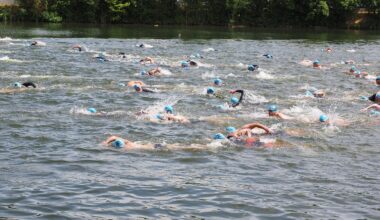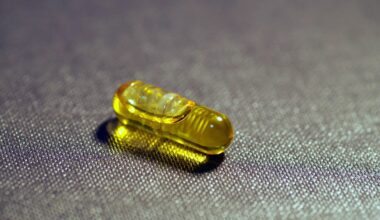Meal Planning Tips for Athletes Focused on Recovery
Recovery nutrition plays a crucial role in allowing athletes to maintain peak performance while minimizing injuries. A well-structured meal plan can significantly improve recovery times after intense workouts or competitions. Focus on including a balanced intake of macronutrients, such as carbohydrates, proteins, and fats. Carbohydrates are key for replenishing glycogen stores while proteins are essential for muscle repair and growth. Healthy fats can aid in reducing inflammation, making the planning process an integral part of every athlete’s routine. Staying hydrated is also critical; combine water intake with electrolyte-rich beverages, particularly post-exercise. Aim for whole foods such as fruits, vegetables, lean meats, and whole grains. Keep snacks on hand for quick access to energy when needed. Preparing meals in advance can help avoid last-minute unhealthy choices. Make use of food-prep containers and label them to track nutritional content. Stay committed to your meal plan, and over time, you’ll notice improved performance, less fatigue, and faster recovery. Remember that supplementation can be beneficial when tailored to your specific needs, helping to fill any nutritional gaps.
Incorporate Timing into Your Nutrition Strategy
The timing of meals is just as important as their content in recovery nutrition. Athletes should consider consuming nutrient-dense meals within 30 to 60 minutes following workouts to maximize recovery. This post-workout window is when muscle cells are most receptive to nutrients. It’s advisable to prioritize a meal that combines protein and carbohydrates during this period, as both are crucial for muscle repair and glycogen restoration. A protein shake with a banana or a chicken breast with sweet potatoes can work well. Spacing meals every 3-4 hours throughout the day can help maintain energy levels and aid recovery. Ensure to have snacks available that are high in protein, such as Greek yogurt or nuts, to keep the body fueled throughout the day, optimizing recovery between training sessions. Variety is key; aim for colorful plates filled with different types of fruits and vegetables. They provide essential vitamins and minerals that enhance recovery. Consider consulting with nutritionists or dietitians who specialize in sports recovery to achieve the best personal meal timing strategies.
Focus on Hydration
Hydration is often overlooked but is vital for optimal recovery. Athletes lose significant amounts of fluids during workouts, and it’s essential to replenish these fluids adequately. Incorporate water-rich foods such as cucumbers, oranges, and watermelon into your diet. Electrolytes are also crucial; they help maintain fluid balance, muscle contractions, and nerve function. Sports drinks can be beneficial, especially after intense activities lasting longer than an hour. Seek to consume approximately 16-24 ounces of fluid for every pound lost during exercise. To effectively monitor hydration levels, pay attention to the color of your urine; pale yellow indicates good hydration while darker shades signal dehydration. Carrying a water bottle can be a constant reminder to drink water throughout the day. For those who struggle with plain water, infuse it with fruits or herbs to make it more appealing. Always listen to your body’s signals; fatigue and headaches may indicate dehydration. Using hydration drinks can aid significantly post-exercise to recover lost electrolytes and encourage faster recovery without digestive discomfort.
Balance Macronutrients for Optimal Recovery
Achieving proper balance among macronutrients can make a considerable difference in recovery. Carbohydrates should make up the bulk of an athlete’s post-workout meal to replenish glycogen stores depleted during training. Aim for whole-grain sources that provide fibers, vitamins, and minerals. Proteins are equally important and should be included in every meal to support muscle repair and growth. A ratio of three parts carbohydrates to one part protein is advisable within post-recovery meals. Fats can be beneficial, especially omega-3 fatty acids found in fish, flaxseeds, and walnuts, which help reduce inflammation and promote recovery. Keep in mind the importance of micronutrients as well; vitamins and minerals like Vitamin C and magnesium play roles in recovery. Including lean proteins from sources such as chicken, turkey, legumes, and fish will provide the necessary amino acids for muscle repair. Planning meals can help make this goal achievable, ensuring every plate is varied enough to cover all the nutrients required. Track your macros using apps or journals to keep your nutrition goals visible and reachable.
Experiment with Supplements Wisely
While whole foods should be the main source of nutrition, some supplements can help enhance recovery for athletes. Protein powders, for example, can be convenient for meeting protein demands, particularly right after workouts. Creatine can also aid recovery by increasing muscle mass and strength but consult with professionals to determine if it is suitable for you. Amino acids, particularly branched-chain amino acids (BCAAs), have gained popularity for reducing muscle soreness. Additionally, omega-3 supplements can also be considered for inflammation reduction. However, it’s essential to approach supplements cautiously; avoid relying solely on them. They should complement your diet, not replace it. Approach a certified sports dietitian or nutritionist for tailored guidance that fits your unique training style, dietary habits, and potential deficiencies. Always choose high-quality supplements, as many products on the market are not regulated for quality. Analyze ongoing symptoms; if you’re feeling fatigued or unwell frequently, revisit your supplement strategy as adjustments may be necessary. Tracking effects over time will help identify what works best for your body in your recovery journey.
Meal Prep Strategies for Busy Athletes
Incorporating meal planning into a busy schedule can be necessary for many athletes. Meal prepping is a strategy that can save time and ensure you eat healthy while recovering. Start by dedicating a specific day, such as Sunday, to prepare and cook meals for the week ahead. Create a balanced menu to ensure a variety of nutrients; consider including different proteins, grains, and vegetables. Use batch cooking techniques to save time; prepare large amounts of quinoa, rice, or pasta and portion them into containers for use during the week. Use versatile ingredients that can be transformed into different dishes to prevent monotony over time. Invest in quality storage containers to keep meals fresh and make them easy to grab. Label each container with dates or ingredients to keep track of freshness. Incorporating snacks like protein bars or nuts can provide easy access to nutrients without preparation time. Involve family or teammates in meal prep sessions for a fun and social atmosphere; this also encourages accountability and a joint commitment to healthy eating.
Continuous Learning and Adaptation
Nutrition for recovery is not static; it’s a continually changing landscape. As an athlete, remain open to learning about your body’s needs and how they evolve. New research is consistently emerging that can influence the best recovery practices. Engage in discussions with dietitians, trainers, and fellow athletes to gauge different strategies and experiences. Participate in workshops and educational programs that specialize in athletic nutrition whenever possible. Utilize resources found at local gyms, online platforms, or sports organizations that promote nutritional education. Forums or athlete communities can also be an excellent source for shared experiences and support. Additionally, keep a food diary to identify how various foods affect your performance and recovery. Reflect on experiences and remain flexible, as what works at one time may need adjustments later. Adaptation and responsiveness to what your body tells you are key components to sustaining development and achieving goals. Staying committed to learning will foster long-term benefits in recovery nutrition, ensuring you reach peak performance consistently.
Meal Planning Tips for Athletes Focused on Recovery
Recovery nutrition plays a crucial role in allowing athletes to maintain peak performance while minimizing injuries. A well-structured meal plan can significantly improve recovery times after intense workouts or competitions. Focus on including a balanced intake of macronutrients, such as carbohydrates, proteins, and fats. Carbohydrates are key for replenishing glycogen stores while proteins are essential for muscle repair and growth. Healthy fats can aid in reducing inflammation, making the planning process an integral part of every athlete’s routine. Staying hydrated is also critical; combine water intake with electrolyte-rich beverages, particularly post-exercise. Aim for whole foods such as fruits, vegetables, lean meats, and whole grains. Keep snacks on hand for quick access to energy when needed. Preparing meals in advance can help avoid last-minute unhealthy choices. Make use of food-prep containers and label them to track nutritional content. Stay committed to your meal plan, and over time, you’ll notice improved performance, less fatigue, and faster recovery. Remember that supplementation can be beneficial when tailored to your specific needs, helping to fill any nutritional gaps.


